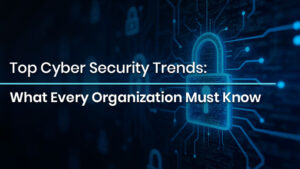
How to Harden Your Infrastructure Using CIS Benchmarks
How to Harden Your Infrastructure Using CIS Benchmarks Introduction As more organizations go faster with their digital transformation, the security and resilience of IT infrastructure
Limited-Time Offer! Get an exclusive 40% OFF on IPSpecialist Premium Monthly & Annual Plans. Use Promo Code: UPSKILLNOW at checkout.

How to Harden Your Infrastructure Using CIS Benchmarks Introduction As more organizations go faster with their digital transformation, the security and resilience of IT infrastructure

Azure Certifications – Validate Your Azure Cloud Skills Introduction Cloud computing has transformed the business landscape, providing scalability, flexibility, and affordability in a way

Top Cyber Security Trends: What Every Organization Must Know Introduction In an era marked by digital transformation, remote workforces, and rapidly evolving threat landscapes,
Table of Contents
Protecting your company from the constantly changing and more sophisticated risks that hackers offer is not just a good idea in the modern digital world but also an absolute must. Due to the potentially disastrous effects of a successful breach, which can include everything from data theft and financial loss to reputational harm, cybersecurity has emerged as a key priority for companies of all kinds. Attackers are always coming up with new ways to break into systems and networks, and the threat landscape is ever-changing. This article will better understand how you can protect your Enterprise from hackers.
Check Out Our Cybersecurity Courses Now!
Here are some steps to help protect your enterprise from hackers:
Enforce strong password policies and Multi-Factor Authentication (MFA) for all users. This makes it harder for hackers to gain unauthorized access.
Limit access to sensitive data and systems to only those who need it. Regularly review and update access permissions.
Implement strong encryption protocols for data in transit and at rest. This helps protect data from being intercepted or stolen.
Segregate your network into different segments to limit the lateral movement of attackers. Implement network security controls to detect and prevent unauthorized access.
Regularly back up critical data and systems and test the backups for data integrity and recovery procedures. This is essential to mitigate the impact of a successful cyberattack.
Use endpoint security solutions (antivirus, anti-malware, endpoint detection and response) to protect individual devices within your network.
Create and enforce security policies that detail acceptable use, data handling, and password management. Ensure that employees follow these policies.
Assess the security practices of third-party vendors and service providers who have access to your data or systems. Ensure they meet your security standards.
If your enterprise develops its software, ensure that secure coding practices are followed during development to prevent vulnerabilities.
Educate your employees about common threats like phishing, social engineering, and other attack vectors. Encourage them to report suspicious activity.
Implement a SIEM system to centralize and analyze security events, helping in the early detection of security incidents.
Consider investing in cybersecurity insurance to mitigate potential financial losses in a breach.
Consider working with cybersecurity experts or consultants who can provide advice and assessments.
Protecting your enterprise from hackers is essential to safeguard sensitive data, maintain business continuity, and protect your organization’s reputation. The applications of cybersecurity measures are numerous and crucial for various aspects of your enterprise. Here are some critical applications:
Cybersecurity helps protect sensitive and confidential data, such as customer information, financial records, intellectual property, and employee data. This is vital for maintaining trust and compliance with data privacy regulations.
Effective cybersecurity measures ensure that your business operations continue functioning even in the face of cyber threats. This includes mitigating the impact of cyberattacks, minimizing downtime, and enabling quick recovery.
Demonstrating strong cybersecurity practices can build and maintain trust with your customers. Customers who know their data is safe are likelier to do business with your enterprise.
Cybersecurity is crucial for compliance with industry-specific and regional regulations, such as GDPR, HIPAA, or PCI DSS. Failing to protect data can result in legal and financial consequences.
Cyberattacks can result in significant financial losses, not only from theft but also from downtime, recovery efforts, and potential lawsuits. Effective cybersecurity minimizes these financial risks.
For organizations that rely on intellectual property, such as software code, research, or patents, cybersecurity measures help protect these assets from theft or espionage.
A successful cyberattack can harm your organization’s reputation. Committing to cybersecurity can mitigate reputational damage and help you maintain a positive image.
Cybersecurity is essential for safeguarding the integrity and security of the supply chain. Attackers can exploit weaknesses in the supply chain to gain access to your systems.
In sectors like critical infrastructure, transportation, and healthcare, cybersecurity is essential for preventing cyberattacks that could have real-world safety implications.
Ransomware attacks can paralyze an organization. Cybersecurity measures can help prevent ransomware attacks and reduce the likelihood of having to pay for ransomware.
Strong cybersecurity practices can be a differentiator in the marketplace. Businesses with a reputation for security may have a competitive advantage over those with weaker cybersecurity postures.
Cybersecurity applications include training employees to recognize and defend against phishing, social engineering attacks, and common entry points for hackers.
Cybersecurity measures protect the integrity and availability of your network and infrastructure, ensuring they function as intended.
Applications for detecting and responding to threats in real time are essential for minimizing the impact of cyberattacks and preventing data breaches.
Securing mobile devices and remote access to enterprise systems is a critical cybersecurity application as remote work becomes more common.
As organizations adopt cloud services, cybersecurity measures are essential to protect data and applications hosted in the cloud.
As the Internet of Things (IoT) grows, securing IoT devices and networks is a vital cybersecurity application to prevent attacks on interconnected devices.
Hackers target small businesses for several reasons, even though they may have different resources or levels of data than larger enterprises. Small businesses are attractive targets for cybercriminals due to various factors:
Cybersecurity is an ongoing process. Hackers continually evolve their tactics, so it’s essential to adapt your security measures accordingly. One may dramatically lower the chance of a successful cyberattack and safeguard your organization from hackers by adopting these best practices and remaining watchful.
© 2025 All rights reserved | Privacy Policy | Terms and Conditions | Sitemap | Cookie Policy




